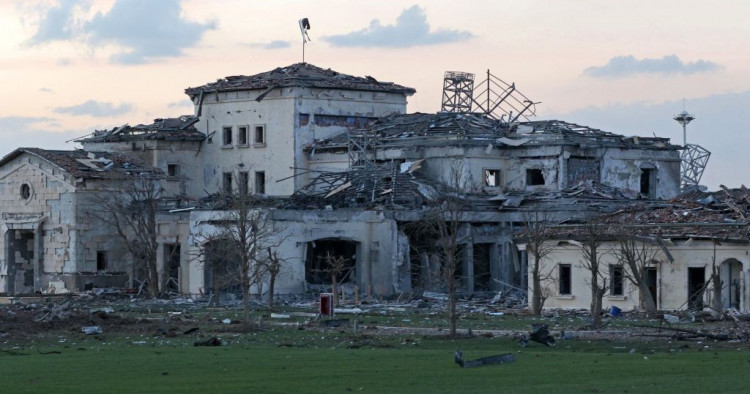Contents:
- What prompted the IRGC to strike Erbil?
- As Russia’s invasion continues, the situation in Ukraine is growing steadily worse
- Don’t believe the hype when it comes to Russia recruiting Syrians to fight in Ukraine
- Israel’s unlawful barrier to Palestinian family reunification
- Pakistan’s opposition parties may have Imran Khan on the ropes
- Women’s empowerment in Jordan
What prompted the IRGC to strike Erbil?
Alex Vatanka
Director of Iran Program and Senior Fellow, Frontier Europe Initiative

Recent events raise the possibility of the intensification of the Iranian-Israeli cycle of retaliation. On March 7, an Israeli strike hit a target close to Damascus, killing two officers from Iran’s Islamic Revolutionary Guard Corps (IRGC). Since 2011, Israel has carried out hundreds of such attacks in Syria to prevent the consolidation of Iranian power and to stop the flow of military equipment to the Syrian government and Iran’s Lebanese ally, Hezbollah.
Almost as a rule, Tehran has not acknowledged such strikes, as doing so would require the Iranians to retaliate and risk escalation of the cycle of tit-for-tat against Israel. Instead, Tehran has opted to put such losses down as a necessary cost of its long-term project of entrenching itself on Syrian territory. But now Iran seems to be rethinking this approach. After the March 7 Israeli strikes in Syria, the top brass of the IRGC made a rare admission of Israel’s role and vowed revenge. On March 13, the same IRGC fired missiles at the Kurdish Iraqi city of Erbil, targeting what it claimed were operational bases for the Israeli intelligence service, Mossad.
The motivations behind the IRGC’s actions will be the subject of considerable speculation in the weeks to come. Given that the IRGC’s leadership is close to Moscow, there is the question of whether the strikes against Erbil were aimed at distracting the Americans from the Russian invasion of Ukraine. While the war in Ukraine may have played a role in Iran’s calculations, the Biden administration quickly made sure to decouple the Erbil strikes from the U.S.-Iran negotiations over Tehran’s nuclear program that are presently at an impasse thanks to last-minute Russian subversion.
Iran’s decision to openly retaliate against Israel is more likely to reflect two realities to which Tehran feels it has to respond. First, Israel is carrying out more kinetic action against Iran. Going forward, this might not be limited to Iranian interests in Syria, but could extend to sites inside of Iran as well. Most recently, there were reports of an Israeli strike against an IRGC base in Iran’s Kermanshah Province in mid-February. Tehran will not want to retaliate by striking targets inside of Israel but wants to limit Israel’s operational access.
This brings Iran’s immediate neighbors into the equation, from the Kurdistan Regional Government in Iraq that has long had a working relationship with Israel to the UAE and Bahrain and possibly other Gulf states that are expanding their security and military ties with Israel. Iran’s state-run Press TV called the strikes on Erbil a “wake-up call” for countries that give Israel an operational platform against Iran. If so, Tehran wants other neighbors to hear the same message. The risk for Iran, however, is that its ultimatums will force the same neighbors to distance themselves even more from Tehran.
Follow on Twitter: @AlexVatanka
As Russia’s invasion continues, the situation in Ukraine is growing steadily worse
Iulia-Sabina Joja
Director, Frontier Europe Initiative; Project Director, Afghanistan Watch

The third week of Russia’s invasion of Ukraine has seen a continuation of the Putin regime’s atrocities and war crimes. The Russian siege and bombing of Ukrainian cities such as Kherson in the east and Mariupol in the south have given rise to a massive humanitarian crisis. Despite pretending to engage in negotiations, Russia is continuing to destroy Ukraine, all because it wants to be free and independent of Russia. Despite these atrocities and contrary to what the majority of pundits expected, Ukraine is holding its ground and will continue to do so. The Ukrainian armed forces have been performing exceptionally despite long odds. According to Ukraine, they have also been joined by 20,000 volunteers from around the world. In response, Russia targeted a training base close to the Polish border with a missile strike on March 13, killing at least 35, and declared it is recruiting Syrian fighters.
In the third week of Russia’s invasion of Ukraine, Western support has been half-hearted. Militarily, we have no public overview of Kyiv’s capability needs; we only know what it is demanding and that its calls remain mostly unheard. President Volodymyr Zelenskyy and every Ukrainian with a voice in the West is asking to “close the sky” over Ukraine by imposing a no-fly zone. The West, however, has ruled it out. Ukrainians are then asking for fighter jets to be able to protect Ukrainian cities from Russian carpet bombing. Poland has offered its MiG-29s on the condition that its strategic partner, the U.S., helps to transfer them and replaces the fighter jets with F-16s. The U.S. has declined, fearing escalation with Russia. Finally, Ukraine is begging for air defense systems, but these calls have also gone unanswered.
Politically, the West has failed Ukraine too. Beyond urgent military and humanitarian aid, Ukraine needs symbolic support. That is why President Zelenskyy has applied for his country’s candidate status to the European Union (EU). Eight Central and Eastern European countries — including Bulgaria of the Black Sea countries — wrote a letter offering their support for an “immediate EU accession perspective.” Last week in Versailles, after an hours-long debate, Ukraine was not granted candidate status, due to opposition from Germany and the Netherlands, cancelling out a symbolic gesture that would have made an enormous difference to Ukraine’s morale — a country that Russia invaded in 2014 because it wanted to join the EU.
In the fourth week of Russia’s invasion of Ukraine, we can expect to see the situation continue to worsen. Ukrainians will fiercely defend their territory as the humanitarian catastrophe grows ever more serious. The number of refugees and internally displaced persons will continue to multiply — and so too will the Russian war crimes. Peace negotiations will carry on, but despite pundits’ and diplomacy lovers’ optimism, we have no reason to believe Russia will stop its atrocities in the coming weeks. The threat of a chemical false flag attack looms large, according to Western intelligence, as Russia’s criminal tactics increasingly resemble those it used in Syria.
Follow on Twitter: @IuliJo
Don’t believe the hype when it comes to Russia recruiting Syrians to fight in Ukraine
Charles Lister
Senior Fellow, Director of Syria and Countering Terrorism & Extremism programs

As Russia continues its brutal invasion of Ukraine and its losses continue to mount, speculation has been rife that soldiers and militiamen loyal to Syria’s Assad regime are being recruited to fight alongside the Russian military in Ukraine. In publicly aired comments on Friday, President Vladimir Putin and his Minister of Defense Sergei Shoigu discussed the issue, with Putin welcoming the help of “16,000 volunteers” that Shoigu claimed had applied from the Middle East. Social media has been awash with claims of a network of “recruitment centers,” along with a flurry of images showing pro-Assad fighters alongside Russian flags.
So far though, there has been no evidence to substantiate any of the claims. All images distributed online have in fact been old, including video footage of Christian militiamen disseminated last week by Russia’s Defense Ministry. One poster marking the death of a Syrian soldier that was shared virally among pro-regime channels as “evidence” of the first Syrian death in Ukraine was actually of a soldier killed in Syria in 2015. Shoigu’s claim of 16,000 volunteers, meanwhile, seems more likely to have been a political attempt to match Ukrainian President Volodymyr Zelenskyy’s foreign volunteer claim than a description of reality. And claims that “14 recruitment centers” have been set up across Syria remain highly suspect, given that no actual evidence has emerged to support their existence.
Beyond refuting the wave of fake claims and unsubstantiated reports from highly subjective opposition sources, it is also worth considering what Russia would gain from recruiting Syrians to fight in Ukraine. A U.S. defense official’s anonymous claim to The Wall Street Journal that Moscow was seeking Syrian urban warfare specialists was baffling, as no such thing exists. Since Russia’s intervention in Syria in September 2015, the Kremlin has been decidedly unimpressed with pro-regime military capabilities — struggling against corruption, disloyalty, and ineptitude. If any Middle Eastern forces were to be of actual use to Russia in Ukraine, it would be Hezbollah, but there would not appear to be any scenario in which that was likely to happen. Even recruiting Syrians as a holding force would be a perplexing move given that they do not speak the language, know nothing of the environment or culture, and would be sitting ducks for a localized insurgency.
Nevertheless, while no evidence has emerged to validate claims of Syrians fighting in Ukraine, there does appear to have been a small, localized, and targeted attempt inside Syria to scope out volunteer interest. Several credible posts have appeared on social media accounts associated with the 4th Mechanized Division and the National Defense Forces, seeking names and phone numbers of those interested. These posts are real, but the prospects for a major Russian transfer of Syrian personnel into Ukraine are distinctly unclear, and certainly unproven.
Follow on Twitter: @Charles_Lister
Israel’s unlawful barrier to Palestinian family reunification
Carole Daniel Kasbari
Non-resident Scholar

On March 10, Israel's parliament enacted a bill denying naturalization to Palestinians from the occupied West Bank and Gaza who marry Israeli citizens. This legislation superseded a similar interim order approved in 2003 in the midst of the Palestinian uprising and reaffirmed annually until it expired in July 2021. While most foreign nationals who marry Israelis can live in Israel and eventually become citizens, Palestinians and certain other Arabs cannot. Last summer, the Knesset failed to adopt the law because it lacked support from the governing coalition's left-wing and Arab members. The opposition, led by former Prime Minister Benjamin Netanyahu, supports the bill but did not vote on it in July in order to embarrass the government. However, this time around Interior Minister Ayelet Shaked, of Naftali Bennett’s far-right Yamina Party, worked tirelessly to guarantee the outcome of the vote along both coalition and opposition lines, resulting in just 15 members of the 120-member Knesset voting against the renewed one-year extension. While Labor abstained from voting, only the two Arab parties (Ra’am and the Joint List) and Meretz voted against it.
Shaked and other officials have admitted that the bill is primarily motivated by the desire to preserve Israel's Jewish majority. A month before the vote, on Feb. 9, the interior minister made her intentions clear in an interview to the Yedioth Ahronoth newspaper, saying, “We don’t need to mince words, the law also has demographic reasons.” It is intended, she said, to prevent a “creeping right of return.” Demographics have been central to the law since its inception in 2003, all the way up to the Supreme Court verdict maintaining it in 2012
Shaked celebrated the passage of the legislation on March 10 by tweeting that it was a victory for "a Jewish and democratic state" and a defeat for "a state for all its citizens." The latter expression is commonly used by Israel's Palestinian citizens, who account for 21% of the population, to emphasize their desire for civil and national equality. Nevertheless, the regulation does not apply to the West Bank's roughly 500,000 illegal Jewish residents, who live in the "hostile areas” and have Israeli citizenship. Thus, this law best exemplifies the ascendancy of Jewish supremacism in Israel, making it a Jewish rather than a democratic state.
The good news is that several rights groups, including Adalah, have indicated that they will challenge the law before Israel's Supreme Court. If that does not work, affected Palestinian families could decide to petition against it one by one, clogging the judicial system and making the situation untenable for Israel in the long term.
Follow on Twitter: @CarolDkas
Pakistan’s opposition parties may have Imran Khan on the ropes
Marvin G. Weinbaum
Director, Afghanistan and Pakistan Studies

Pakistan’s prime ministers have not infrequently been forced out but never by a parliamentary vote of no-confidence. But within a matter of days, Prime Minister Imran Khan faces the possibility of being removed from office by a vote of Pakistan’s National Assembly. On March 8, a wide array of opposition parties tabled a no-confidence motion that must be voted on by March 23 at the latest. A usually divided opposition that crosses the political spectrum has found this an opportune time to unite to bring down Khan. With the economy badly sagging under a heavy weight of debt, rising energy costs, and stubbornly high inflation, the Khan administration has been accused of economic mismanagement. The prime minister is also seen as having failed to deliver on several of his promised social and economic reforms and to have repeatedly demonstrated his political ineptness. Khan has additionally handed his enemies a new line of attack — his strikingly erratic behavior. The latest, his recent foreign policy rants, have damaged relations with the European community and the U.S., and contributed to tarnishing Pakistan’s international reputation.
The outcome of the National Assembly’s vote remains cloudy for a reason anyone familiar with Pakistan’s politics can readily appreciate. The country’s politicians are addicted to the sport of wheeling and dealing, where the perks of power and status can mean as much as policy concessions. A frantic effort is under way by the competing opposition and government camps to secure the support of members of parliament. Khan’s ousting will require defections by dissidents from within his party or the loss of a coalition party partner. In what appears to be a desperate effort to win over disaffected pro-government elements Khan has thus far failed to appease, he has with thundering rhetoric returned to playing his tried-and-true populist card.
Not yet revealed in current political maneuvering for power is the customary hidden hand of the military. The army, which facilitated Khan’s election in 2019 and was rewarded with a largely deferential government, is uncomfortable with being tied to an increasingly unpopular administration. But so far at least, there seems to be some reluctance to take its chances with a newly jerry-built regime. After a recent claim by the government’s information minister that the Khan administration has the backing of the military establishment, its spokesman was prompted to counter that “the military has nothing to do with politics.” While many in Pakistan are disappointed by the prospect of again having an elected government deprived of a full term of office, the transfer of power would at least be constitutional.
Malavika Radhakrishnan, research assistant to Marvin G. Weinbaum, assisted with this article.
Follow on Twitter: @mgweinbaum
Women’s empowerment in Jordan
Dima M. Toukan
Non-Resident Scholar

Last week, just one day before International Women’s Day, a Jordanian lawmaker publicly challenged other parliamentarians on the floor of the House of Representatives to identify a place in the world where women are more “honored” than in Jordan. With Jordanian women facing mounting challenges in the most testing economic conditions, this was a telling statement. At its core, it reflected the continuing inability of a fragmented women’s movement to transform the consciousness of Jordanians on gender equality; but more broadly, it also highlighted the vast differences between women’s rights actors and those who determine their status under the law.
Parliament was recently embroiled in a legislatively sterile discussion over whether to add “Jordanian women” to the title of the Second Chapter of the Constitution, which, after much deliberation, now reads the “Rights and Duties of Jordanian Men and Women.” Parliament did not even consider the more substantive — and decades-old — demand by the women’s movement to include the word “sex” in Article 6 of the Constitution, which effectively protects equality before the law, regardless of race, language, or religion, but not sex. Calls to address this omission have been criticized as part of a Western agenda that will undermine the sanctity of the family — allegations that easily resonate with the average Jordanian.
The insistence on this omission runs contrary to the spirit of the government-endorsed 2020-2025 National Strategy for Women, which aims to mobilize action to empower women, uniting actors and guiding resource allocation and performance measurement. But Jordan’s record of national strategy execution is unimpressive. The evaluation of the previous strategy’s implementation revealed a poor division of roles, limited achievement, marginal government support, and weak accountability. With the current politicization of the women’s agenda playing to conservative sentiments, the cost of ignoring another national strategy is still low.
Whether it is women’s 15% participation in the labor market, rising gender-based violence incidents (up 30% during the pandemic), weak political participation, or patriarchal social norms and discriminatory laws, the needle is just not moving enough on basic reforms. Until those who hold power recognize the social and economic costs of tokenistic action and elevate women’s empowerment and gender equality to strategic priorities linked to government funding, the rights of half the country’s population will be compromised, not honored.
Follow on Twitter: @DimaToukan
Photo by SAFIN HAMED/AFP via Getty Images
The Middle East Institute (MEI) is an independent, non-partisan, non-for-profit, educational organization. It does not engage in advocacy and its scholars’ opinions are their own. MEI welcomes financial donations, but retains sole editorial control over its work and its publications reflect only the authors’ views. For a listing of MEI donors, please click here.













